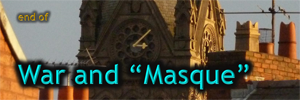“War and ‘Masque’” series of
 articles
articles
2014
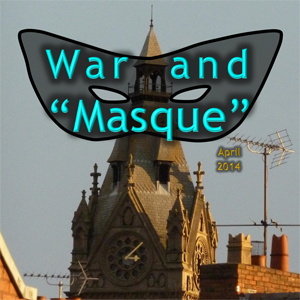
2014 Apr
Apr 08 Tue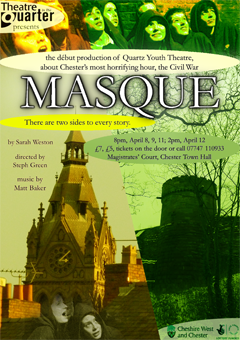
- Because it’s confusing!
- Is it?
Last summer Theatre in the Quarter, the Chester-based drama organisation, narrowed the age intake for their widely successful Jigsaw Music Theatre from six-to-sixteen-years to six-to-thirteen, and set up a brand new group, Quartz Youth Theatre, for the teenagers who enjoy doing the acting and singing done at Jigsaw but wanted more sophisticated parts than Jigsaw could provide. Having performed in Jigsaw for many years and become Jigsaw’s assistant director, I immediately recognised Quartz as a boon and a windfall and I signed up. I have never regretted it. The awesomeness of Quartz is something there can be no confusion about.
No member of Quartz’s directorial team is a member of Jigsaw’s, but the two groups have the same Company and Stage Managers, as well as the same poster/programme designer (me), and also the same ethos of community and unity of purpose as we strive to enhance with diction and conviction the depiction of the tale at hand. Jigsaw is very much a family, and Quartz even more so, despite them being sisters (this family metaphor is falling apart, unlike the families concerned - by which I mean drama groups). Multiple members of Quartz have younger siblings in Jigsaw, which I find rather neat, and because Quartz and Jigsaw are sister groups their rehearsals and performances never clash, which is perfect for me as an actor in one and an AD in the other.
To clarify, Quartz as a thing is younger than Jigsaw but its cast members are older than Jigsaw’s. Theatre in the Quarter is the parent organisation overseeing both Jigsaw and Quartz, but was spawned from Jigsaw in 2005 as the people behind Jigsaw wanted to expand their remit and put on plays with adult casts... Oh, that’s made everything more confusing. Sorry guys. I’ll change tack. Here’s a graphic.
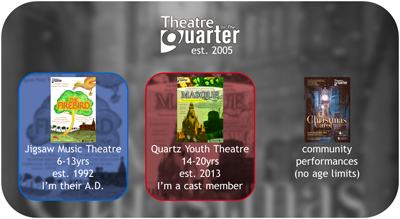
You’re probably still confused as to why I’ve started this article this way. The introductory quote is from “Masque”, Quartz’s début play that we’re performing this week (by “we”, read “Quartz”), about the effects of the English Civil War on Cestrians, and the difficulties of portraying such a period without making much use of cold history-book facts, which are a world away from the general population who had to deal with starvation and gunfire and cannonfire and actual fire and death every day.
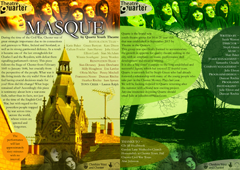 You might well also be confused as to the title of the play. Let me explain. A masque is a play of a particular style consisting of dialogue, song, and pantomime, popular with royalty around the time of the Civil War. “Masque” is pretty much a masque itself, though we’re performing it in the Magistrates Court of the Town Hall, rather than the king’s court, and there’s little room for pantomime in a play as serious as “Masque”.
You might well also be confused as to the title of the play. Let me explain. A masque is a play of a particular style consisting of dialogue, song, and pantomime, popular with royalty around the time of the Civil War. “Masque” is pretty much a masque itself, though we’re performing it in the Magistrates Court of the Town Hall, rather than the king’s court, and there’s little room for pantomime in a play as serious as “Masque”.
So now you know who Quartz are and what this piece is, all that’s left for me to say is this. If you’re confused as to how to spend tonight and tomorrow and Friday evening (8 o’clock) or Saturday lunchtime (2 o’clock), please come to see “Masque”!
Apr 09 Wed
Jigsaw Music Theatre is embroiled in civil war. Barely nine months ago a schism emerged and tore the group apart. One side stood by the time-tested Jigsaw standards and swore allegiance to an able director, an adroit writer, and a musical mastermind. The other side carved their own standards in the Jigsaw image and their oath of loyalty was to a capable director, an adept writer, and a musical maestro.
Those dissenters, those rebels, those wearied yet unweary resisters, they abandoned the Jigsaw name and looked for a new appellation. They sought to make dramas that were hard-hitting but beautiful and quirky, and sought a name to match while still alluding to their homeland, Chester’s Garden Quarter. The name: “Quartz”.
They had a name. They had a cause. They lacked a script. Where does a new drama company go? What directions do they take? How can they be true to the principles they hold dear while not doing everything the old Jigsaw way?
Meanwhile the soldiers who kept the Jigsaw name going were advancing, forging ahead, devising the scenes they’d use as weapons, revising the skills with which they’d throw such weapons.
Quartz were still in the quagmire of their identity crisis. They imagined themselves as different characters, each short-lived; they assumed ephemeral roles. Fires are fun to play, your body undulating like flames, the occasional arm flicking out like a spark. Then again, it’s not a worthwhile exercise to have a drama with no characters with proper emotions and back-stories. What is a play without people acting as people?
“Just act yourself,” their director suggested. “Take a copy and pass the rest along,” announced their writer. “Repeat after me,” said their composer.
Eventually the coin dropped. Quartz finally knew who they were. They had a map to the battle-field. They marched.
They worked and worked and toiled and toiled. They trained their biceps to launch their choreography like javelins. They trained their voices for the manifold war-cries, the words of passion and strivings. They trained their entire souls and bodies for theatrical battle. They trained their entire souls and bodies for the showdown.
Jigsaw arrived at the battle-field first. Quartz arrived moments after. They looked at each-other as they made their final preparations.
And the apathy of humanity toward dramatic tragedy was their common enemy.
Apr 12 Sat
Today’s was the final performance of “Masque”. Today’s was our last chance to take the audience on our funny little journey from the Waiting Hall to the Magistrates Court, then to that side-room I don’t have a name for, and then on to the Porch where we did the epilogue. Today’s was a powerful spectacle.
To thank us for bringing Chester’s war-time history to the fore in such a compelling manner (if I can bring myself to say that), the Town Hall manager gave us a tour of the parts of the building we didn’t visit during the show or use as our green room. We went up to the Lady Mayoress’s Parlour, featuring decadence unseen by me since Fontainebleau, April 2012. We went down to the dungeons, under the Magistrates Court, which were cold and grey like a convict’s eyes, the only warmth coming from my peers and my (slightly suppressed) wit in these “prison cellars” (as I called them). We also went up into the Tower.
As I’ve thus hinted, some parts of the Town Hall (the parts accessible to the public and aristocracy) are lavishly furnished and richly decorated, adorned with panelling as dark as a living forest and carpet as purple as something so deep and purple I can’t think what it would be and complete this simile. And some parts of the Town Hall are grubby middens.
The Tower is one such grubby midden. The floorboards are grey, as if sprinkled with ash, and despite it being mid-afternoon little light comes through. The wooden ladders between the upper floors are decrepit and dangerous and off-limits even to us; the metal ladders are dusty and rusty, but at least they’re secure.
The longest ladder had forty-four rungs in all, forty-four narrow iron rods to hold onto with your hands and step onto with your feet. (I promise you that’s how a ladder works.) So let’s say the height to climb was ten metres. Ten metres between the Town Hall’s second floor and the third floor. Ten metres to climb if you dared. I dared, as did all my peers.
To climb such a ladder with your eyes on the wall in front of you is quite nerve-racking. To look up even more so. To look down... Don’t look down, except perhaps to remember how far you’ve come. But you receive some comfort, enough comfort, from the inflexibility of the iron and the encouragement of your friends above and below you. Their calls ring true. You can do each rung. You can do no wrong.
And you continue to climb. You cannot bring yourself to do wrong.
You couldn’t bring yourself to do wrong. You’ve done the best you can. You arrive at the next floor, the highest floor feasible. And your friends at the top pull you onto the ledge. And you behold the view, out over the city of Chester, out in every direction, to the cathedral, the river Dee, the shopping precincts, the homely suburbs. The buildings look like paper cut-outs in the sun. The people on the streets look like ants, and you remember being an ant yourself.
But you scaled the ladder of theatrical heights. You brought a play up from a school nativity to a hard-hitting thought-inspiring drama. And what’s even more wonderful is that your friends were with you every step of the way.
To see photos relating to “Masque”, see Theatre in the Quarter’s Facebook page.
And the Chester Chronicle wrote a review.
